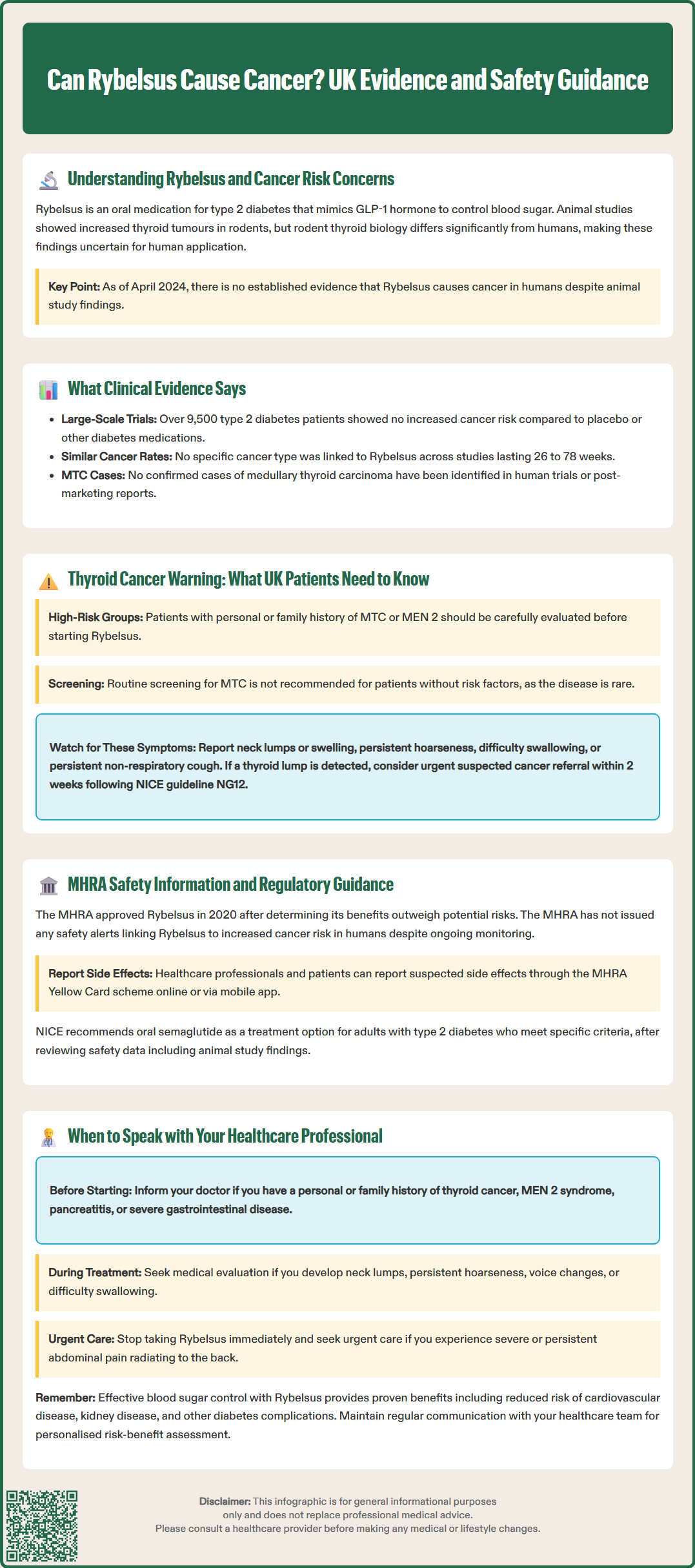
Can Rybelsus cause cancer? This question concerns many patients prescribed this oral diabetes medication. Rybelsus (semaglutide) is a glucagon-like peptide-1 (GLP-1) receptor agonist licensed in the UK for type 2 diabetes mellitus. Concerns arose from animal studies showing thyroid tumours in rodents, prompting regulatory warnings. However, current clinical evidence does not establish that Rybelsus causes cancer in humans. The MHRA and EMA maintain precautionary measures whilst ongoing surveillance monitors long-term safety. Understanding the distinction between animal findings and human evidence is essential for informed treatment decisions. This article examines the available data, regulatory guidance, and practical advice for UK patients.
Quick Answer: Current clinical evidence does not establish that Rybelsus causes cancer in humans, despite thyroid tumours observed in rodent studies.

Mounjaro® is the most innovative GLP-1 medication proven to dramatically curb appetite, hunger, and cravings to help professional men achieve substantial weight loss.
Start Here
Wegovy® is a weekly injectable GLP-1 medication with proven effectiveness in reducing appetite, hunger, and cravings to help busy professionals lose significant weight.
Start HereRybelsus (semaglutide) is an oral glucagon-like peptide-1 (GLP-1) receptor agonist licensed in the UK for the treatment of type 2 diabetes mellitus in adults. As the first oral formulation in its class, it offers an alternative to injectable GLP-1 therapies. Rybelsus works by mimicking the action of the naturally occurring hormone GLP-1, which stimulates insulin secretion in a glucose-dependent manner, suppresses glucagon release, and slows gastric emptying.
Concerns about a potential link between Rybelsus and cancer have emerged primarily due to findings in animal studies involving rodents. These preclinical studies identified an increased incidence of thyroid C-cell tumours (medullary thyroid carcinoma) in rats and mice exposed to semaglutide. It is important to understand that rodent thyroid physiology differs significantly from that of humans, and the relevance of these findings to human patients remains uncertain.
The question "can Rybelsus cause cancer?" is one that many patients and healthcare professionals consider when evaluating treatment options. Whilst the animal data prompted regulatory warnings, there is currently no established evidence that Rybelsus causes cancer in humans (as of April 2024). The Medicines and Healthcare products Regulatory Agency (MHRA) and the European Medicines Agency (EMA) have implemented precautionary measures, including specific warnings regarding thyroid tumours and ongoing pharmacovigilance to monitor long-term safety.
Understanding the distinction between preclinical animal findings and clinical evidence in humans is essential for informed decision-making. This article examines the available evidence, regulatory guidance, and practical advice for UK patients prescribed Rybelsus.

Clinical trial data from the PIONEER programme—a series of phase 3 studies evaluating oral semaglutide in over 9,500 patients with type 2 diabetes—have not demonstrated an increased risk of cancer in humans. The PIONEER trials, which included studies comparing Rybelsus to placebo and other glucose-lowering medications, monitored participants for adverse events including malignancies over treatment periods ranging from 26 to 78 weeks.
Across these trials, the incidence of malignant neoplasms was low and comparable between semaglutide-treated patients and control groups. No specific cancer type emerged as being associated with Rybelsus use, and the overall safety profile was consistent with other GLP-1 receptor agonists. However, it is important to note that the duration of these trials was relatively short compared to the timeframe typically required for cancer development, and longer-term observational data continue to be collected.
Post-marketing surveillance and real-world evidence studies are ongoing to assess the long-term safety of semaglutide. Large-scale cardiovascular outcomes trials, such as SUSTAIN-6 (which evaluated injectable semaglutide), have also not identified increased cancer risk. A systematic review and meta-analysis of GLP-1 receptor agonist trials published in Diabetes, Obesity and Metabolism (2020) found no significant association between this drug class and overall cancer incidence.
Regarding thyroid cancer specifically, no signal for increased medullary thyroid carcinoma (MTC) has been confirmed in clinical trials or post-marketing reports to date. The theoretical risk is based on animal data, and the biological mechanisms observed in rodents may not translate directly to humans. Nonetheless, regulatory authorities maintain precautionary warnings for patients with personal or family history of MTC or Multiple Endocrine Neoplasia syndrome type 2 (MEN 2).
The Summary of Product Characteristics (SmPC) for Rybelsus in the UK includes special warnings and precautions regarding thyroid C-cell tumours, reflecting findings from animal studies. According to the UK SmPC, healthcare professionals should consider the following:
Patients should be informed of the potential risk of thyroid C-cell tumours
The relevance of rodent C-cell tumours to humans is unknown
Patients with a personal or family history of medullary thyroid carcinoma (MTC) or Multiple Endocrine Neoplasia syndrome type 2 (MEN 2) should be carefully evaluated before treatment
These warnings are precautionary measures based on the rodent data, even though the relevance to humans remains unclear. MTC is a rare form of thyroid cancer, accounting for approximately 3-4% of all thyroid malignancies in the UK. It arises from parafollicular C-cells that produce calcitonin, and certain genetic mutations (particularly in the RET proto-oncogene) predispose individuals to this cancer type.
Before initiating Rybelsus, healthcare professionals should take a thorough medical history to identify any personal or family history of thyroid cancer or MEN 2. Routine screening for MTC in patients without risk factors is not recommended, as the disease is rare and screening tests (such as serum calcitonin measurements) have poor predictive value in the general population and may lead to unnecessary investigations.
Patients taking Rybelsus should be counselled to report symptoms that could indicate thyroid pathology, including:
A lump or swelling in the neck
Persistent hoarseness or voice changes
Difficulty swallowing (dysphagia)
Persistent cough not related to respiratory infection
Whilst these symptoms are non-specific and more commonly related to benign conditions, they warrant clinical evaluation. If a thyroid lump is found, consider urgent suspected cancer referral (within 2 weeks) in line with NICE guideline NG12. It is important to emphasise that no causal relationship between Rybelsus and thyroid cancer has been established in humans.
The Medicines and Healthcare products Regulatory Agency (MHRA) approved Rybelsus for use in the UK in 2020, following a comprehensive review of efficacy and safety data. The MHRA's decision aligned with the European Medicines Agency (EMA) assessment, which concluded that the benefits of oral semaglutide outweigh potential risks when used according to licensed indications.
The MHRA requires that the product information for Rybelsus includes clear warnings about the thyroid tumour findings in rodents. Healthcare professionals are advised to consider patients' risk factors before prescribing. The MHRA also mandates ongoing pharmacovigilance, with manufacturers required to submit periodic safety update reports and investigate any signals of potential harm.
Yellow Card reporting is encouraged for any suspected adverse reactions to Rybelsus, including new diagnoses of cancer. Patients and healthcare professionals can report suspected side effects via the MHRA Yellow Card scheme at www.mhra.gov.uk/yellowcard or search for 'MHRA Yellow Card' in the Google Play or Apple App Store. This spontaneous reporting system allows the MHRA to detect safety signals that may not have been apparent in pre-marketing clinical trials. To date, the MHRA has not issued any safety alerts specifically linking Rybelsus to increased cancer risk in humans.
The National Institute for Health and Care Excellence (NICE) has evaluated oral semaglutide in its technology appraisals for type 2 diabetes management. NICE guidance recommends oral semaglutide as a treatment option for adults with type 2 diabetes, subject to specific criteria. The NICE assessment considered the available safety data, including the animal findings, and concluded that the evidence supports its use within the licensed population.
Regulatory guidance emphasises individualised risk-benefit assessment. For most patients with type 2 diabetes and no contraindications, the established benefits of improved glycaemic control outweigh theoretical risks based on animal data. In the PIONEER 6 cardiovascular outcomes trial, oral semaglutide demonstrated cardiovascular safety (non-inferiority) compared to placebo. Healthcare professionals should discuss these considerations with patients as part of shared decision-making.
Patients prescribed Rybelsus should maintain open communication with their healthcare team throughout treatment. It is important to discuss any concerns about cancer risk or other potential side effects, as understanding the evidence can help alleviate anxiety and support informed treatment decisions.
Before starting Rybelsus, inform your GP or diabetes specialist if you have:
A personal history of any thyroid disorder or thyroid cancer
A family history of medullary thyroid carcinoma or MEN 2
Any history of pancreatitis
Severe gastrointestinal disease
These factors may influence whether Rybelsus is the most appropriate treatment option for you. Your healthcare professional will conduct a thorough assessment and may recommend alternative glucose-lowering medications if concerns are present.
During treatment, contact your GP or diabetes nurse if you experience:
Any new lump or swelling in the neck region (which may require urgent suspected cancer referral within 2 weeks)
Persistent hoarseness, voice changes, or difficulty swallowing
Severe or persistent abdominal pain, particularly if radiating to the back (which could indicate pancreatitis)
Unexplained weight loss or other concerning symptoms
Whilst these symptoms are not necessarily indicative of cancer, they warrant clinical evaluation. If pancreatitis is suspected, stop taking Rybelsus and seek urgent medical attention, as stated in the UK SmPC. For other concerns, consult your healthcare professional before making any changes to your treatment.
For patients with type 2 diabetes, the benefits of effective glucose management—including reduced risk of cardiovascular disease, kidney disease, and diabetes-related complications—are well established. The decision to use Rybelsus should be based on individual circumstances, considering both the proven benefits and the theoretical risks. Regular follow-up appointments allow for ongoing monitoring and adjustment of treatment as needed.
If you have specific concerns about cancer risk, request a detailed discussion with your GP or diabetes team, who can explain the current evidence and help you weigh the risks and benefits in the context of your personal medical history.
No, clinical trials involving over 9,500 patients with type 2 diabetes have not demonstrated an increased risk of cancer in humans taking Rybelsus. The incidence of malignancies was comparable between semaglutide-treated patients and control groups across the PIONEER trial programme.
The warning is based on preclinical studies showing thyroid C-cell tumours in rodents exposed to semaglutide. However, rodent thyroid physiology differs significantly from humans, and no causal relationship has been established in human patients.
Patients with a personal or family history of medullary thyroid carcinoma or Multiple Endocrine Neoplasia syndrome type 2 (MEN 2) should be carefully evaluated before starting Rybelsus. Your healthcare professional will assess individual risk factors during prescribing decisions.
All medical content on this blog is created based on reputable, evidence-based sources and reviewed regularly for accuracy and relevance. While we strive to keep content up to date with the latest research and clinical guidelines, it is intended for general informational purposes only.
DisclaimerThis content is not a substitute for professional medical advice, diagnosis, or treatment. Always consult a qualified healthcare professional with any medical questions or concerns. Use of the information is at your own risk, and we are not responsible for any consequences resulting from its use.